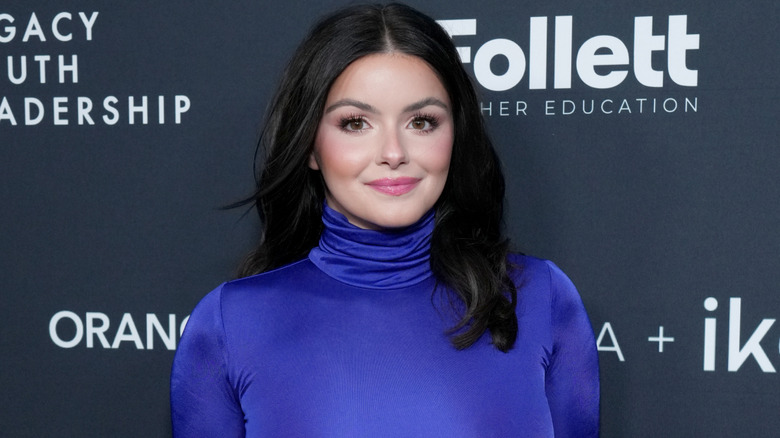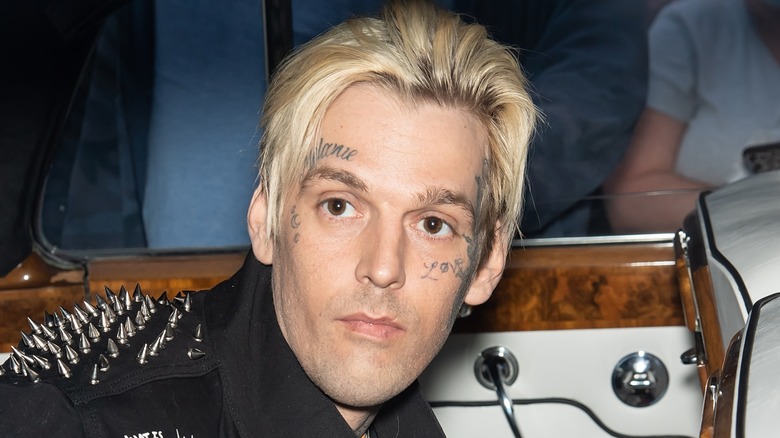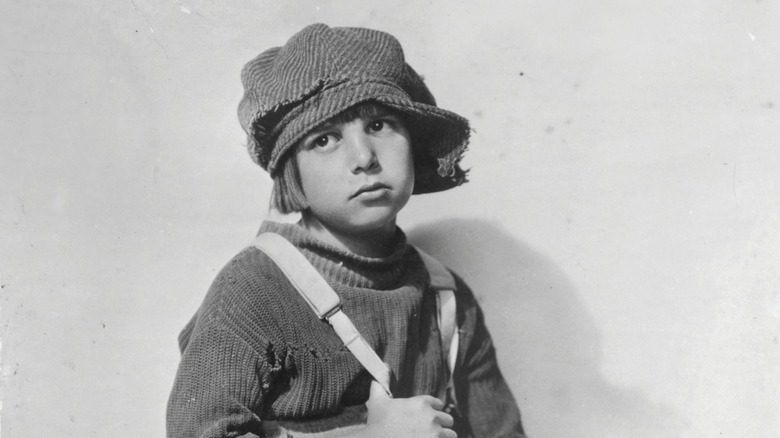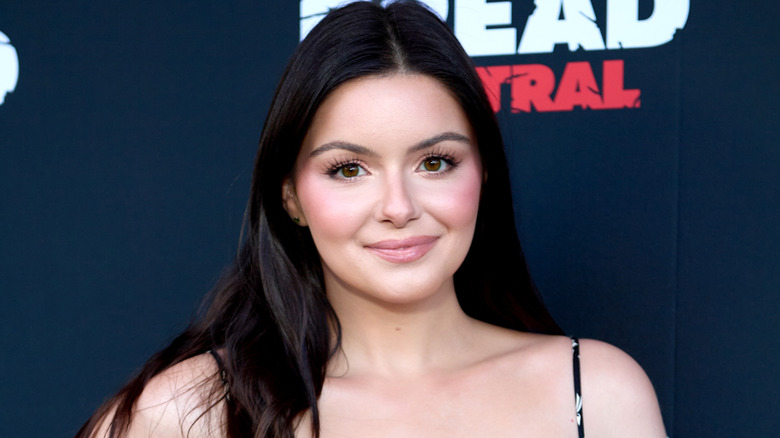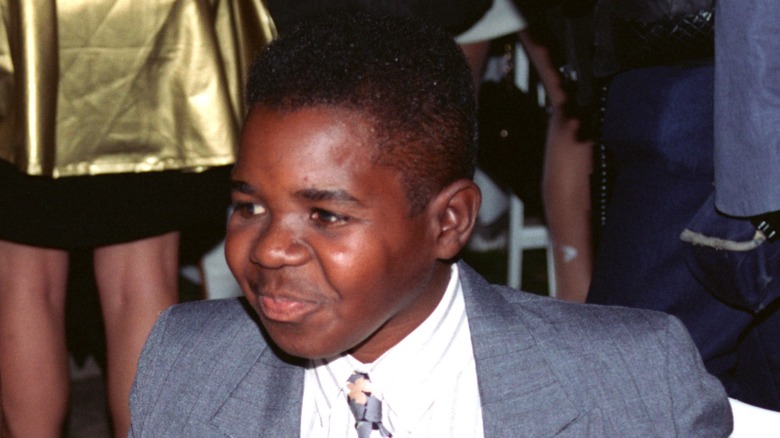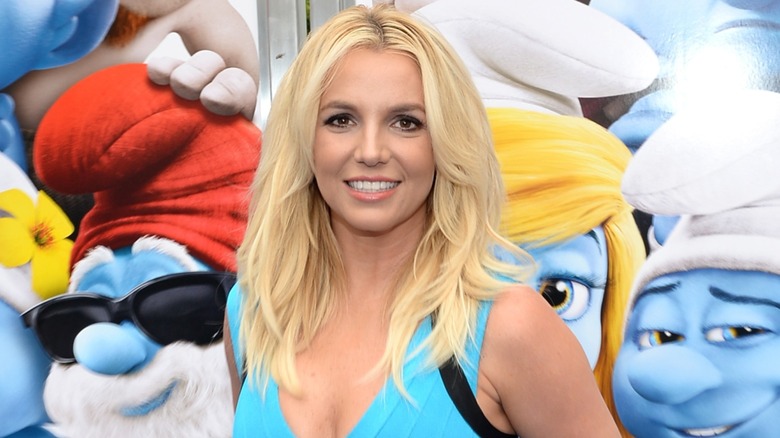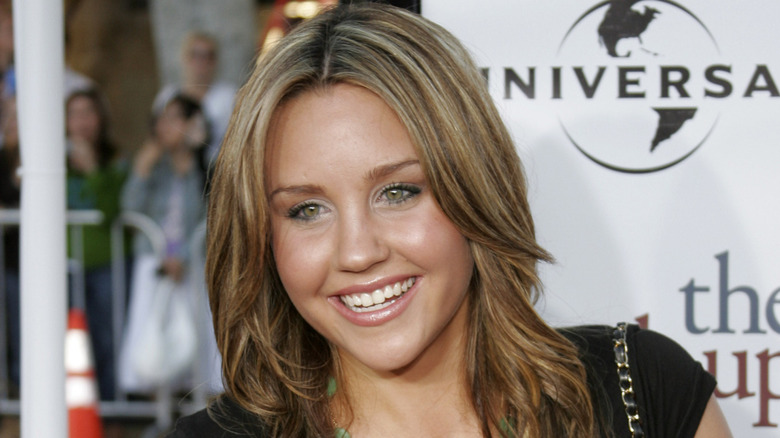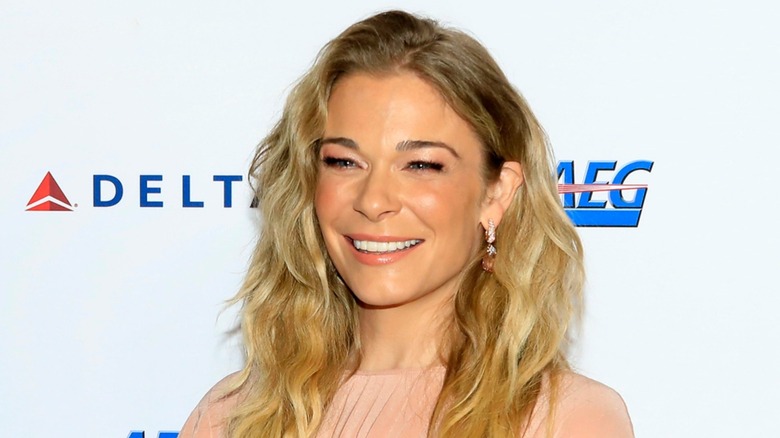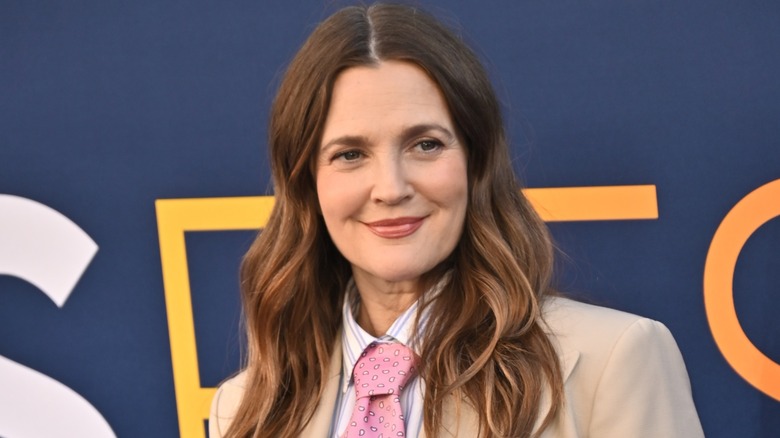Child Stars Who Battled Their Parents In Court
We may receive a commission on purchases made from links.
The following article includes mentions of child abuse and struggles with eating disorders and drug use.
Child stars often bear a double-edged sword. On one hand, getting started in Hollywood early can fast-track a young actor's journey to financial freedom. Case in point: "Black-ish" star Marsai Martin once revealed that she had no intentions of touching money from her Coogan Account (Martin has been working since she was five years old). Similarly, despite working with Disney for a long time, "That's so Raven" star Raven-Symoné has yet to spend earnings from her 1989 debut role as Olivia Kendall on "The Cosby Show."
On the flip side, there is a dark side associated with being a child star. A handful of child celebrities have been subject to controversies that shook the television industry. "iCarly" star Jennette McCurdy, for instance, detailed her disturbing experience in the 2022 publication "I'm Glad My Mom Died," in which she made several allegations against her mom, including being thrust into stardom against her will and being pushed into developing an eating disorder.
Parent-child wrangles are not so uncommon in Hollywood, with some celebrities having been seriously disgraced by their children, but in the case of child stars, things can get out of hand because they bring home the bacon. Over the years, there have been accusations of financial mismanagement, physical and emotional abuse, and the need for control, all of which have resulted in legal wars.
Aaron Carter accused his mom of mishandling his finances
Aaron Carter rose to fame at only 9 years old when he covered the Jets' 1986 hit "Crush on You." What started as a joke ended with a record deal and a performance with the Backstreet Boys (Aaron's brother, Nick Carter, was a member of the famous band), and Aaron eventually became a star in his own right. Aaron released his debut album when he was just 10 years old, which went on to sell a million copies. His sophomore compilation, "Aaron's Party (Come Get It)," tripled the musician's success.
Aaron's career was managed by his mother, Jane Carter, but what would have been a thriving family business eventually turned sour. In 2003, 16-year-old Aaron dismissed Jane as his manager over allegations of financial misconduct — she had reportedly withdrawn $100,000 from his bank account without his consent. Aaron later considered seeking legal emancipation, but he eventually mended his relationship with his mom out of the courts. "I'm looking forward to putting my family back together and working together side by side with all my children," Jane told The Associated Press at the time (via Today).
Still, Aaron's financial woes didn't end. In 2016, six years before his sudden death, Aaron revealed that, when he was 18, he "got $2 million in trust-fund money, and ... got $4 million in taxes my parents didn't pay when I was 11 and 12 years old" (via GQ). At the time of Aaron's death, he reportedly owed $241,000 in taxes, and despite reportedly having assets worth $810,547, his administrator said the money couldn't be paid off since they'd run out of cash after paying attorneys and other creditors.
Jackie Coogan's case led to the creation of the Coogan Law
Jackie Coogan came into the spotlight as the star of Charlie Chaplin's 1921 movie "The Kid." Jackie was barely 10 years old when he incorporated Jackie Coogan Productions, a company that saw him earn up to $4 million as a minor. In April 1938, 23-year-old Jackie took his mom, Lilian R. Coogan, and his stepfather to court over withheld earnings. The "Flying High" actor claimed that he was only given a weekly $6.50 allowance, which stopped when he turned 21 years old.
Lilian denied the claims at the time through her lawyer, who told the press (via The New York Times), "The young man is suffering from a hallucination. He has received everything that he is entitled to and more. His mother was entitled to all his earnings up to the time he became of age." In the end, Jackie was only awarded a meager $126,000, a far cry from his initial request.
Jackie's case led to the establishment of the Coogan Law a year later, which seeks to protect the earnings of minors in the acting industry. The law was amended in January 2000 to assert that the income belongs to the children and not their parents, and further required that 15% of revenue generated by young workers be placed in a blocked trust named the Coogan Account. Not even banks are allowed to deduct fees from the Coogan Account; in 2015, the parents of child actors Alex Gonzales and Jadon Monroe won a case against the Bank of America for withdrawing maintenance fees.
Ariel Winter accused her mom of physical and emotional abuse
Ariel Winter began acting in commercials at 4 years old and later landed her breakout role as Alex Dunphy on the ABC sitcom "Modern Family." The role not only made her a familiar face but also earned the actor several award nominations and wins. While Winter was thriving in Hollywood, her success was clouded by family disputes. In 2012, she was caught in a custody battle that saw her sister, Shanelle Gray, quickly become her temporary legal guardian after she accused her mom, Chrisoula "Crystal" Workman, of being emotionally and physically abusive.
Chrisoula's control over her daughter's finances was also restricted, even though she dismissed the abuse allegations. "I love my daughter very much. I would never abuse her in any way and I have always tried my best to always protect her and do what is right for her," she said in a statement to the press (via ABC). Her declaration was contradicted by Winter's sister, who claimed to have had a similar experience in Workman's hands.
Gray's place as Winter's legal guardian was made formal in 2014, while her dad, Glenn Workman, was placed in charge of her finances. Winter became legally emancipated from her parents in 2015 and took to X to relay the news, writing, "I am now officially emancipated!!! I'm really lucky I have an amazing support system and lovely people in my life." Winter has since moved on from the situation and is healing from her childhood trauma.
Gary Coleman challenged his adoptive mother's conservatorship petition
Gary Coleman gained wide public recognition for his role on the late '70s show "Diff'rent Strokes." Gary was only 10 years old when he began portraying Arnold Jackson, an orphaned Harlem native who was adopted by a wealthy man alongside his brother, Willis Jackson-Drummond (Todd Bridges). Arnold's signature catchphrase, "Whatchu talkin' 'bout Willis?" would go on to be one of television's most memorable one-liners.
In his peak earning years, Gary commanded a reported paycheck of $100,000 per episode. In 1990, the courts shut down an attempt by the actor's adoptive mom, Sue Coleman, to be made his legal conservator. Sue had claimed that Gary's use of prescription drugs for his illness — he suffered from a chronic kidney disease that affected his stature — had a "debilitating effect" on him (via UPI).
The previous year, Gary had filed a lawsuit against his mom and other defendants in which he accused her of misappropriation of funds amounting to $1 million. He sued her again in February 1990, seeking $25,000 in damages and accusing her of making false claims in her filing for conservatorship. In the long run, Gary was granted $1.3 million, but his finances dwindled to a point where he worked as a security guard in the late '90s. Following Gary's ultimate passing in May 2010, he named his friend and former manager Dion Mia as the executor of his will.
Macaulay Culkin removed his parents' names from his trust
Macaulay Culkin won himself a huge fanbase when he starred in the 1990 film "Home Alone." The role earned Macaulay several accolades, including an American Comedy Awards win. Needless to say, the actor also smiled his way to the bank since the movie's sequel earned him more money than its first installment. He told Variety that he owned "5% of the net profit" in addition to a 15% merchandising deal. Macaulay eventually retired from entertainment in his teens in pursuit of a more normal life.
Despite his success, Macaulay's family had their fair share of problems. Their woes began in the mid-'90s when his parents, Patricia Brentrup and Kit Culkin, who jointly managed his career before his early retirement, split up. At the time, Brentrup was granted temporary custody of Macaulay and his brother, Kiernan Culkin. Amid the custody battle, Macaulay chose to protect his assets (he had a fortune in the neighborhood of $15 million to $20 million).
"We didn't want to go with my father," he told Esquire. "It's always misconstrued that I 'emancipated' myself from my parents. I legally took my parents' names off of my trust fund and found an executor, someone who would look over my finances, just in case anyone wanted to stick their f***ing pinkie in the pie." Macaulay has since made an acting comeback, but his relationship with Kit remains turbulent.
Britney Spears sought to end a years-long involuntary conservatorship
Britney Spears almost missed a shot at getting cast on "The Mickey Mouse Club," the show that made her famous. When she first auditioned for the variety show at 8 years old, she was considered too young, but she tried her luck again at 11 years old and ultimately had a two-year run in the spotlight. However, Britney truly established herself as a pop star with the release of her 1999 debut album "Baby One More Time." The album sold 2.1 million units within 11 weeks of its release, and its lead song topped the Billboard 200 and Billboard Hot 100 charts.
By 2008, Britney was a millionaire whose business networks were estimated to generate a reported $110 million to $120 million annually. Following Britney's 2008 breakdown, her father, Jamie Spears, was granted temporary conservatorship over her estate, which later became permanent. Over the years, Jamie worked alongside different co-conservators and even stepped down for health reasons, but one thing was clear: he wasn't on good terms with Britney.
In February 2021, a documentary titled "Framing Britney Spears" triggered the #FreeBritney movement. Later that year, Britney sought to end the conservatorship and told the courts in a statement (via Variety), "I just want my life back. And it's been 13 years. And it's enough. It's been a long time since I've owned my money. And it's my wish and my dream for all of this to end without being tested." The conservatorship was finally terminated in November 2021, but Britney and Jamie still battled it out in court over attorneys' fees and alleged mismanagement until they reached a settlement in 2024.
Amanda Bynes tried to be legally emancipated from her parents
Amanda Bynes' claim to fame was as a child actor in the sketch comedy children's series "All That." Performing on the show earned Amanda a CableACE Award nomination and also set the stage for the launch of her own spinoff, "The Amanda Show." Bynes' future appeared to be promising, but she later retired from acting unexpectedly and made headlines for having a series of family squabbles and other personal tragedies.
In 2014, Amanda took to social media to accuse her father Rick Bynes of sexual harassment in a series of now-deleted tweets. The former actor claimed that Rick repeatedly asked for sexual favors (which she declined) and expressed that living with him against her will was "a total nightmare" (via E!). Amanda further alleged that her father was "verbally and physically" abusive and would criticize her looks, also adding that her mom, Lynn Bynes, was aware of the inappropriate dynamics of their relationship. The former actor later recanted her statement and blamed her tweets on a "microchip in my brain."
According to "All That" producer and writer Dan Schneider, Amanda's relationship with her parents was always troubled, and when she attempted to be emancipated when she was between 16 and 17 years old, he controversially backed her up. "She wanted that for herself," Schneider recalled in an interview with DanWarp. "She turned to her team, which included her lawyer, her agent, her manager, her publicist, me ... We supported her, she tried to get emancipated and it ended up not working out and she didn't."
LeAnn Rimes sued her dad for misappropriation of earnings worth more than $7 million
LeAnn Rimes was in her teens when she found fame with the release of her 1996 album "Blue." The album's titular track was a game-changer, while the album itself triumphed over other country albums for 28 weeks on the Billboard Top Country Albums chart. LeAnn then received Grammy nominations for best new artist and best country vocal performance, both of which she won (she was the youngest Grammy winner in history).
"Blue" later sold eight million copies worldwide, but the Rimes' family could only celebrate her success for so long. In May 2000, the singer filed a lawsuit against her father, Wilbur C. Rimes, and former comanager Lyle Walker, whom she accused of misappropriation of earnings worth more than a whopping $7 million. At the time, Wilbur denied the claims through his attorney. He filed a countersuit in December 2000 in which he portrayed LeAnn as a rebellious teenager.
Wilbur claimed that LeAnn was extravagant in her spending habits; she had allegedly displayed reckless behavior, including totaling an expensive Bentley and splurging on her hair. LeAnn's camp dismissed the allegations, telling USA Today (via ABC) that "the document that Mr. Rimes filed is so full of false and misleading statements that are totally unrelated to this case." Ultimately, LeAnn and Walker finally reached a settlement while she and her dad patched things up.
Drew Barrymore emancipated herself from her mom at 14
Drew Barrymore was just 7 years old when she became famous for starring in Steven Spielberg's 1982 movie "E.T. the Extra-Terrestrial." Barrymore's story then turned tragic overnight, as she got caught up in the Hollywood party scene; the actor was barely 10 years old when she had her first drink and started doing cocaine at 12 years old. Unfortunately, her mother, Jade Barrymore, played a role in her spiraling.
Drew's relationship with her parents was complicated. Her father, John Drew Barrymore, and Jade divorced when she was young. Jade raised Drew on her own, but according to the actor, the former wasn't a responsible parent. The pair often went to parties together — in fact, Drew was a minor when she began partying at New York's infamous nightclub, Studio 54, where she started using drugs. The actor was eventually sent to a rehabilitation facility at 12 years old. Drew would have been yet another child star who went off the deep end, but at 14 years old, she was legally emancipated from her mom.
In her book "Wildflower," the actor wrote that Jade was present in court on the said day, and she "felt so sad, but too much had happened" (via The Guardian). Drew continued, "The judge walked in and the day went on in a blur. People testified, but it wasn't heavy or dark. It was a way to ask, 'Should this kid become an adult?'" In the end, Drew and her mom parted ways after sharing a hug. The duo remained estranged for a long time, but they have since mended their relationship.
Mischa Barton sued her mother for misappropriation of funds
Mischa Barton rose to prominence in her teens as a star on the Fox drama series "The O.C." She played Marissa Cooper, a girl who had a turbulent inner life and a generous collection of designer outfits. The role earned Mischa several award nominations and wins, including a Choice Actress award at the 2006 Teen Choice Awards. Even when Mischa's run on the series had ended, the actor capitalized on her fame and commanded paychecks of up to $100,000 for appearances in events outside of the United States.
In April 2015, Mischa filed a lawsuit against her mother, Nuala Quinn-Barton, for mishandling her finances. The actor, whose career has since stalled, made several accusations against Nuala, including lying about how much she was earning for some shows and leveraging her fame to run her own profit-driven ventures.
In March 2016, Mischa dropped the case against her mom without prejudice, which gave her room to pursue it again in the future. When Mischa looked back at their relationship in a chat with the "Call Her Daddy" podcast, she said, "It just wasn't healthy ... In my life, I've really learned to prioritize, like, my chosen family and, like, the people who have really actually been there for me."
If you or someone you know may be the victim of child abuse, has experience with eating disorders, or is struggling with addiction, please contact:
The Childhelp National Child Abuse Hotline at 1-800-4-A-Child (1-800-422-4453) or contact their live chat services
The National Eating Disorders Association website or NEDA's Live Helpline at 1-800-931-2237. You can also receive 24/7 Crisis Support via text (send NEDA to 741-741).
The Substance Abuse and Mental Health Services Administration website or contact SAMHSA's National Helpline at 1-800-662-HELP (4357).

